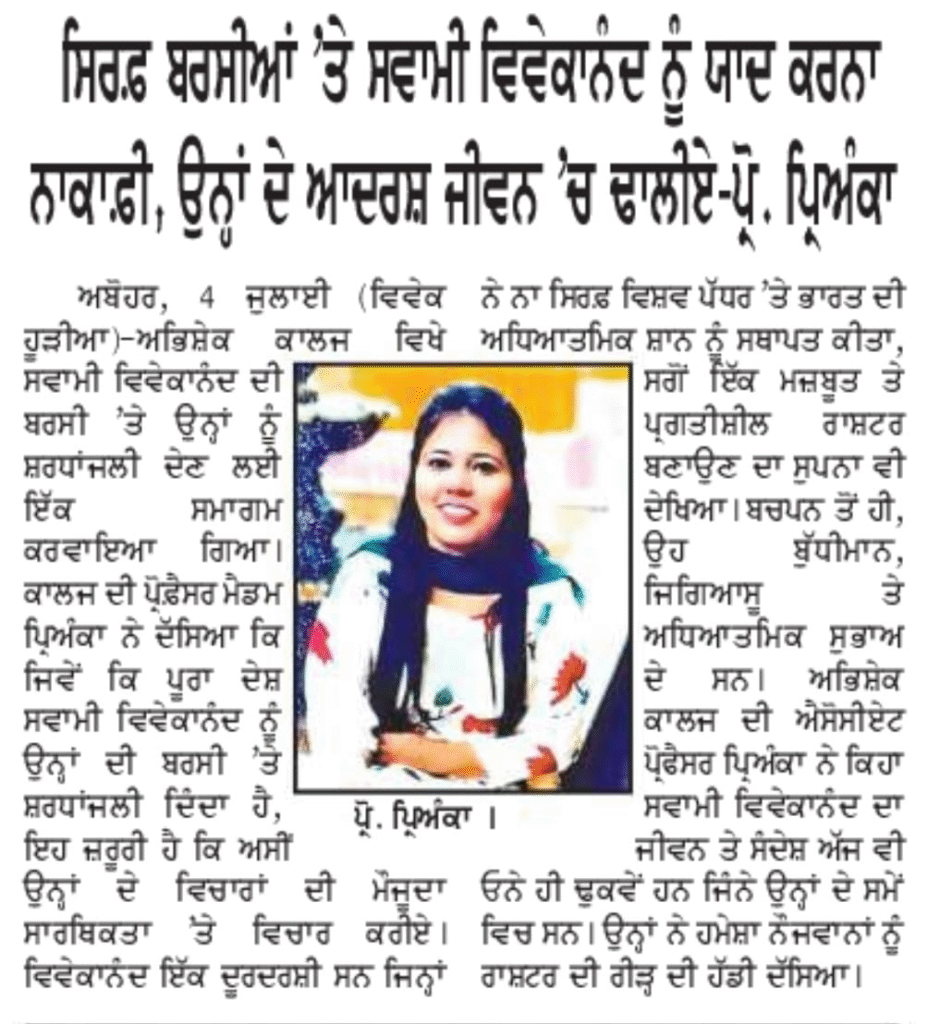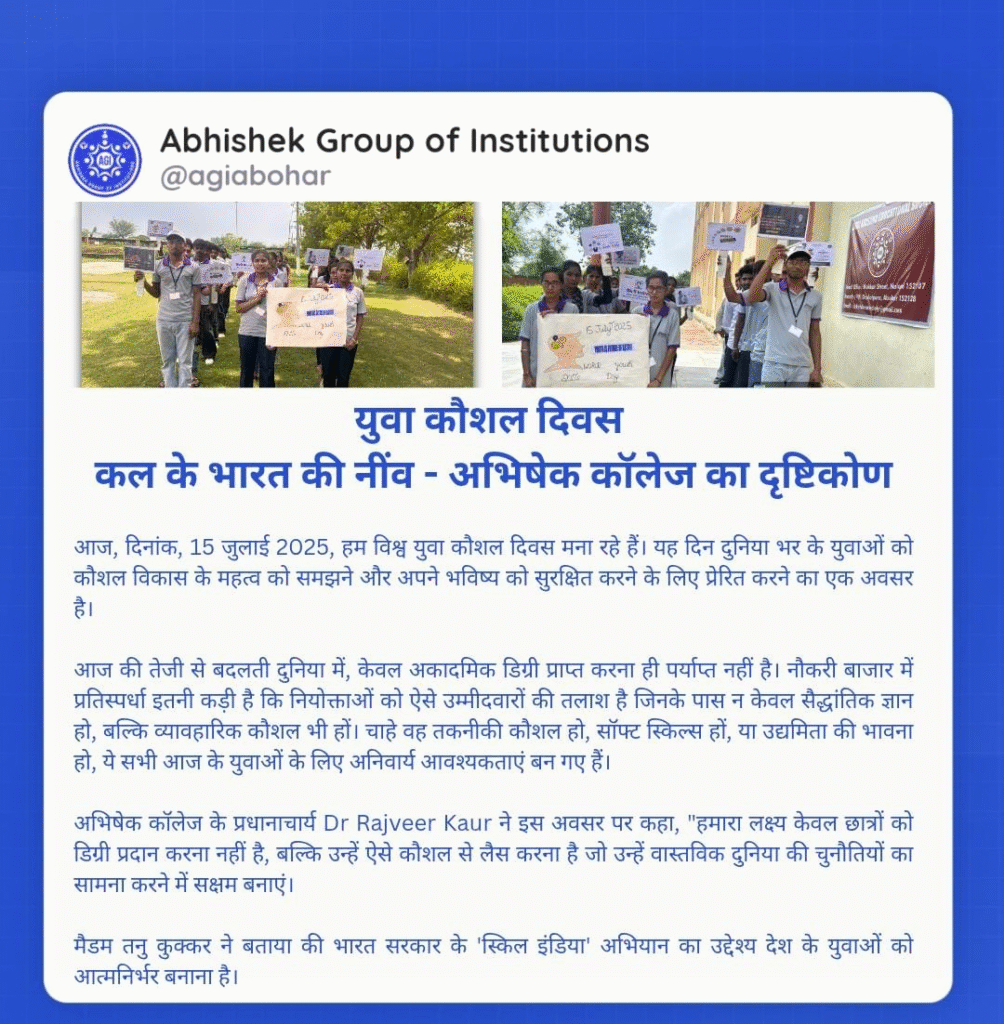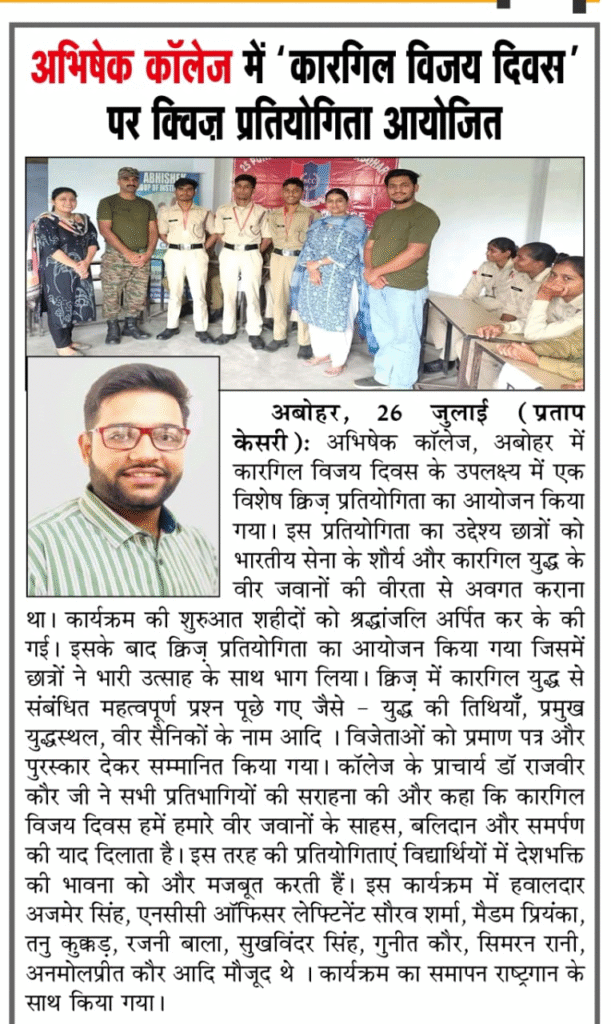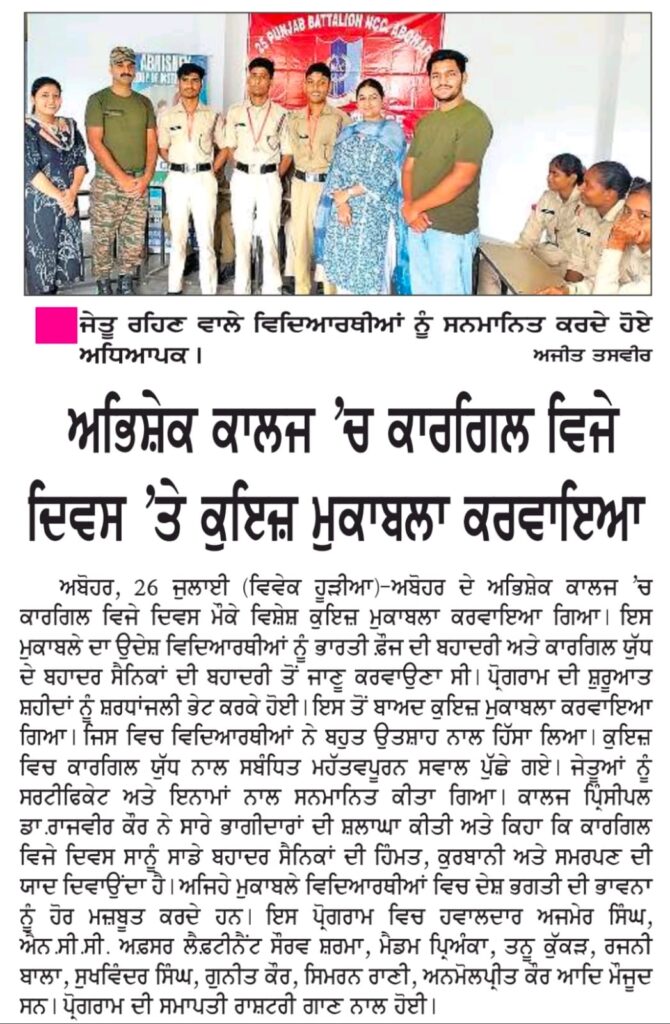1) Swami Vivekananda Ji

2) National Flag Day
National Flag Day(22 July 2025)
National Flag Day in India is celebrated annually on July 22 to commemorate the historic day when
the Constituent Assembly of India adopted the present-day tricolour flag as the official National
Flag of the country. On 22nd July 1947, the Constituent Assembly of India, chaired by Dr. Rajendra
Prasad, adopted the National Flag. This significant day marks the official selection of the tricolour flag
with its deep saffron, white, and Indian green stripes, and the Ashoka Chakra in the centre. The deep
Saffron (Top Band) represents courage, sacrifice, and the spirit of renunciation, White (Middle
Band) signifies peace, purity, and truth and Green (Bottom Band) Stands for fertility, growth, and
auspiciousness of the land. Ashoka Chakra (Navy Blue Wheel): Located in the center of the white
band, it has 24 spokes and represents the Dharma Chakra (wheel of law), symbolizing constant
movement and progress. The adoption came just before India’s independence on August 15,
1947, signifying the culmination of the nation’s struggle for freedom. The objectives of National Flag
Adoption Day celebrations in India is to reinforce the spirit of national unity and integrity among
citizens by honouring the symbol of the national flag and to reflect on the struggles and sacrifices
made by the freedom fighters and leaders who contributed to the adoption of the national flag.
National Flag Day holds immense significance for every Indian citizen. It is a Symbol of
Sovereignty. The flag represents India’s independent status and its right to self-governance. It honors
the countless freedom fighters who laid down their lives for the nation’s independence. On this day,
various events events like Flag Hoisting Ceremonies, Awareness Campaigns , Public Lectures and
Discussions , Art and Cultural Events , Patriotic Activities, Community Outreach are organized across
the country to educate the public, especially the youth, about the flag’s importance and the sacrifices
associated with it.. At last we can say that National Flag Day celebrations extend beyond a singleday
event, symbolizing a pivotal moment in India’s history and its journey towards independence and
unity. It serves as a reminder of the sacrifices made by freedom fighters and the values of democracy,
diversity, and national pride that the flag represents. It encourages collective reflection on the ideals of
freedom and sovereignty, reinforcing a shared commitment to uphold these principles in building a
prosperous and inclusive nation.
3) Remembering the valiant hero of Kargil conflict, “Sher Shah” of Indian Army.

- “Sher Shah” and the Kargil War:Vikram Batra, commissioned into the Indian Army’s 13 Jammu and Kashmir Rifles, earned the moniker “Sher Shah” for his fierce demeanor and leadership during combat.
- Capturing Point 5140:During the Kargil War, Batra led his troops to capture Point 5140, famously declaring “Yeh Dil Maange More!” (“This heart wants more!”) as they secured the peak, according to Brands.live.
- Point 4875 (Batra Top):Batra’s bravery was further displayed in the capture of Point 4875, also known as “Batra Top”, where he helped his troops gain a strategic advantage and eliminated enemy positions.
- Ultimate Sacrifice:Tragically, while assisting in evacuating a wounded soldier, Captain Batra was hit by enemy fire and succumbed to his injuries on July 7, 1999.
- Legacy of Courage:Vikram Batra’s heroism and sacrifice continue to inspire generations, making him a revered national hero and a symbol of courage and patriotism
4) World youth skills day celebration at AGI campus.

5) World youth skills day..
This year’s World Youth Skills Day theme, “Youth Skills for Peace and Development,” highlights the role of youth in peacebuilding and conflict resolution. Various activities, including skill development workshops, training programs, and career fairs, are organized to offer practical learning opportunities and connect youth with potential employers.
Skill competitions are held to showcase talent and foster creativity across different fields. Awareness campaigns further the public understanding of the importance of equipping youth with relevant skills for sustainable development. World Youth Skills Day serves as a platform for advocacy, policy discussions, and collaborative efforts, aiming to create a supportive environment where young people can thrive and contribute positively to society.
6) Kargil Vijay Diwas
Kargil Vijay Diwas, celebrated on July 26th, commemorates India’s victory over Pakistan in the Kargil War of 1999 and honors the sacrifices of Indian soldiers. The war, which lasted for over two months, saw Indian armed forces reclaim territories in the Kargil district of Jammu and Kashmir that had been infiltrated by Pakistani soldiers and militants. This victory is remembered as a testament to the courage, resilience, and patriotism of the Indian armed forces, and is celebrated with tributes, parades, and other events.
The Kargil War, also known as Operation Vijay, was a conflict fought in the Kargil district of Ladakh, India, where Pakistani soldiers and militants infiltrated Indian territory along the Line of Control (LoC). The Indian Army launched Operation Vijay to recapture these areas, facing harsh weather conditions and difficult terrain. Despite the challenges, Indian soldiers fought bravely, displaying exceptional courage and determination. Key battles were fought at peaks like Tololing, Tiger Hill, and Point 4590, with Indian forces eventually reclaiming all the occupied territory.
The war resulted in significant casualties on both sides, with over 500 Indian soldiers losing their lives. Many soldiers were awarded the highest gallantry awards, including the Param Vir Chakra, Maha Vir Chakra, and Vir Chakra. The war also highlighted the importance of vigilance, preparedness, and the unwavering spirit of the Indian armed forces.
Kargil Vijay Diwas serves as a reminder of the sacrifices made by Indian soldiers and the nation’s commitment to protecting its sovereignty. It is a day to honor the heroes of Kargil, reflect on the values of patriotism and unity, and reaffirm the nation’s resolve to defend its borders. The day is celebrated with various events, including flag hoisting ceremonies, tributes at war memorials, and cultural programs.

